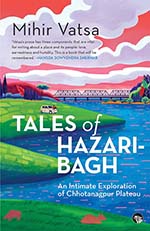Tales of Hazaribagh is much more than the exploratory travelogue its title promises: along with a rich, complex narrative of Vatsa’s discoveries of the Chhotanagpur Plateau, it has autobiography, stories of suspense and the supernatural in the best tradition of ghost stories, social critique, historiography, and an intimate introduction to his roads, his waterfalls, his friends and family. As a student of literature, Vatsa is conscious of the use of language and words, and playfully uses vocabulary and shifting narrative techniques to create a complex, multi-layered text that is informative, thought-provoking, and utterly delightful.
In the Epilogue Vatsa writes, ‘Often in books about travel, the movement happens from home to someplace else. The narrator leaves home to visit a different city or geography. With this book, the motion is reversed.’ He explains, ‘Because Hazaribagh is my home, I often say that I can never go there. Instead, I can only and always return.’

